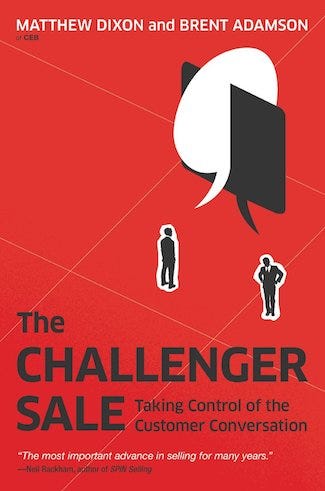
5 Things I Learned about Sales Leadership from 5 Great Business Books
During the past two years I’ve read a handful of very interesting business books that helped me in my daily job as a sales & marketing professional. In fact, I’ve been filtering through dozens of books that come with flashy titles and tell you how successful you’ll be in business, to come down to a very narrow list of the very best that truly helped me in my career.
I’ve compiled the top 5 learnings from five of these books in this article:

1 — Confront the brutal facts
Good to Great, by Jim Collins, is a mixture between entrepreneurial motivation and growth company failures analyzed in an academic way. The book is based on a 5-year research over thousands of companies that have really made a difference when comparing to other “ok” companies in terms of growth. The main learning is that companies typically fail because they don’t want to admit they may be going out of business.
Today’s markets change so quickly that is tough for everybody to keep the pace, so the easiest way to feel comfortable is to deny the actual facts (about competition, innovations or market composition) and pretend the world is wrong and we know everything in the office. That will give you a feeling of comfort and security, but will kill the business in the long term. So remember:
Confront the brutal facts. React.
Extra tip from the book: Build NOT-TODO lists, instead of TODO lists. The problem is that TODO lists become endless and things never get done. However, if you focus on saying NO to irrelevant stuff, you’ll always complete the most business-critical tasks 😉

2 — Do what you do best and outsource the rest
The Effective Executive is a classic by Peter F. Drucker, where the main (and I’d say only) focus of the book is on being effective at work. If we take Drucker’s advice literally, I would recommend you not to read the book at all. This book is a 146-page manuscript that repeats over and over again the same thing:
Do what you do best, and outsource the rest.
The main idea is that we can’t be good at everything. In fact, most humans are very good at only 1–2 things. So, if you really care about being effective (and productive), you should really focus on doing what you are best at. For the rest, you should learn how to delegate and make sure it is executed by someone else. That’s the whole point Drucker is making in that book.

3 — Marketing’s job is to create products that sell, not to sell products
You know they say “don’t judge a book by its cover”, well I did with this one, and I loved it! I found Strategic Marketing Management, by Alex Chernev, on Amazon bought it immediately for its title and the elegance of its cover. To my positive surprise, this has been the best marketing book I’ve ever read.
Alex Chernev is one of the top professors in Strategic Marketing at the prestigious Kellogg School of Management. In this book, Chernev goes for the following marketing mantra:
Marketing’s main goal should be create products that sell, not to sell products.
The book claims that companies confuse marketing with communications and that’s why marketing departments are often very resource-limited and focus on branding and promotion. According to Prof. Chernev, only those companies that rely on strategic marketing to figure out product market fit before even considering a new product line, will eventually be the ones excelling at selling new innovations. I fully concur.
Prof. Chernev goes beyond this concepts and explains how sustained growth can be achieved by enabling systematic market analysis, customer experience research, resource management, competitor analysis and strategic partnerships (what Chernev calls the 5C framework). The ultimate goal of the 5C framework is to boost growth by building products with the highest product-market fit possible. That is, to stay ahead of the market — or as Tim Cook said in the September 2017 keynote at the Steve Jobs theater:
I skate to where the puck is going to be, not where it has been. — Wayne Gretzkyt

4 — If you have an innovation, sell it to visionaries, not enthusiasts
Crossing the Chasm, by Geoffrey Moore, is one of the most acclaimed tech marketing books of all time. This timeless piece of content covers most of the fundamental stuff that one needs to understand about product marketing, and even product management, when it comes to introducing new technology products. Throughout the book there is plenty of marketing concepts, scenarios and examples that can be applied to basically any tech product of our time. However, my favorite part of the book is when the Moore dives into the world of early adopters and how business critical, specially in the B2B industry, is to tell enthusiasts from visionaries.
Here’s the concept: enthusiasts are people who love technology at first sight, yet they don’t have the capability to understand the big picture and how your product could make a big impact in the market. On the other hand, visionaries have a vast experience and understanding of the market dynamics, being able to tell whether your new product will be a hit or a miss. Therefore, your business development efforts should go into finding the visionaries that will take your product to new levels, instead of settling for tech enthusiasts. Or, in Moore’s words:
If you have an innovation, sell it to visionaries, not enthusiasts
For all the details about this marketing concept, you can read a full article I wrote about innovation marketing, early adopters and marketing for visionaries here: The Great Leap: Product Marketing for Visionaries

5 — Teach your customers something new, make them grow business they didn’t know before
Neil Rackham is the author of several sales book, and The Challenger Sale is his latest book as of writing this. As opposed to many sales books where the main theme is around asking the relevant questions, preparing an objection list and building the relationship, Rackham “challenges” all those principles with one premise:
Teach your customers something new, make them grow business they didn’t know before
The main idea that Rackham is proposing is that, instead of just listening to the customer and trying to satisfy their requests, you should challenge your customer with your own thinking and business intelligence. Your job is to make your customers think differently, and you are the one to show them all the possibilities out there. In other words, instead of sticking to customer’s requests or features, you should open your customer’s eyes with challenging ideas that would show them how they could build new innovations and grow new business.
Essentially, this is disruption teaching. That is, when a huge corporation has dominated a market for a long time and a new startup comes along with a very new disruptive technology, the corporation will have to adapt or they will fail big time in that market. In this book, Rackham provides you with a script to show your customer they could disrupt the market too and grow much more than what they have even thought. I consider this priceless, specially in B2B sales.
Conclusions
So, if you were to read only these five books and then build your next venture, this is what could make you more successful:
- Be honest to yourself from day one, accept the market, the competition and, with that, try to break the status quo
- Focus on what you do best and what you love to do, and delegate the rest
- Put special care on strategic marketing to make sure you find product-market fit for your future products, thus ensuring sustained long-term growth
- When building a new innovation, find the visionaries that will validate not only your technology, but also your business model
- In the sales interactions, make sure you teach your customers new stuff that makes them better at what they do
Despite all the wisdom from “these books”, everything shall be taken with a grain of salt. Remember books are written by people, with their biasing and their own feelings and opinions. As a matter of fact, many authors writing great advice on sales & marketing have many times given useless advice in some of their books. It is up to you to try and decide what tactics work best for you and for your business.

